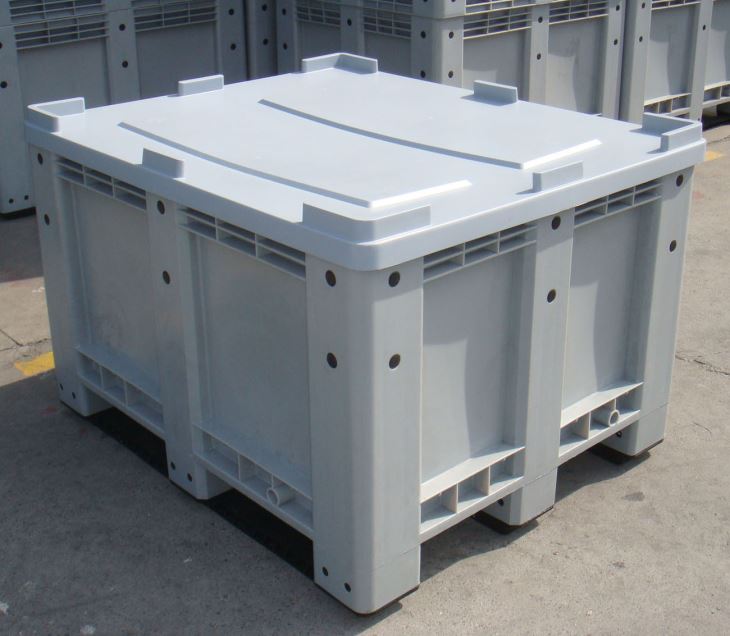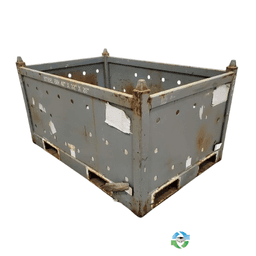The Ultimate Overview to Picking the Right Bulk Containers for Your Service Requirements
Choosing the appropriate mass containers is vital for any kind of service that depends on effective logistics. Various types of containers exist, each designed for specific materials and applications. Factors such as size, product compatibility, and regulative criteria play a considerable duty in this decision-making procedure. Recognizing these components can cause improved functional effectiveness. However, lots of organizations overlook necessary facets that could improve their overall efficiency and sustainability. What are these factors to consider?
Understanding Different Sorts Of Bulk Containers
Mass containers work as important tools for services seeking reliable storage space and transportation remedies. These containers are available in different types, each designed to meet certain operational needs. One usual kind is the intermediate mass container (IBC), which is suitable for fluid and granulated materials, supplying an equilibrium of capacity and maneuverability. Another prominent alternative is the bulk bag, or FIBC, ideal for dry, flowable products. These adaptable containers are light-weight and can be easily delivered and stored. For heavier materials, inflexible mass containers are usually used, supplying toughness and stability for risk-free handling. Furthermore, there are specific containers tailored for unsafe products, ensuring conformity with safety and security policies. Recognizing the distinctive features of these mass container kinds allows companies to make educated choices that optimize logistics and minimize costs. By selecting the right container, firms can boost their functional performance and enhance their supply chain procedures.
Trick Material Factors To Consider for Mass Containers
When selecting mass containers, it is important to consider the materials utilized in their building. Elements such as chemical, toughness, and durability compatibility play a crucial function in making sure the containers fulfill specific operational needs. Furthermore, weight and portability concerns can influence both effectiveness and transport logistics.
Product Longevity and Toughness
Longevity and toughness are crucial consider picking products for bulk containers, as they straight affect the container's ability to stand up to various ecological problems and taking care of processes. Materials such as high-density polyethylene (HDPE), polypropylene, and stainless-steel are typically preferred for their robust homes, providing resistance to temperature level, influence, and abrasion fluctuations. The option of product likewise influences the total life expectancy of the container; stronger products generally cause less regular replacements, bring about cost savings over time. Furthermore, the weight of the product can influence delivery expenses and convenience of handling. Businesses have to consider their certain operational environments and the possibility for wear and tear to assure peak toughness and toughness in their bulk container option.
Chemical Compatibility Variables
Comprehending chemical compatibility is necessary for choosing bulk containers, as the materials made use of have to withstand the particular substances they will certainly hold. Various variables affect compatibility, consisting of the chemical nature of the components, temperature level, and duration of storage. As an example, harsh chemicals might require containers made from stainless steel or specialized plastics that resist destruction. Furthermore, responsive compounds can produce warmth or gases, requiring aired vent or pressure-rated containers. The selection of container material, whether polycarbonate, metal, or polyethylene, must line up with the chemical residential properties of the kept compounds to avoid leakages or breaches. Eventually, an extensive evaluation of these compatibility elements assures risk-free handling and storage, shielding both personnel and the setting while preserving item stability.
Weight and Transportability Concerns
Choosing bulk containers involves not only evaluating chemical compatibility however likewise taking into consideration weight and mobility. Companies need to analyze the ease of handling and transportation to optimize performance. Light-weight products like high-density polyethylene (HDPE) or aluminum can facilitate simpler motion and lower delivery prices. On the other hand, larger containers might offer improved toughness however can impede mobility, particularly in environments needing regular moving. Additionally, the layout of the container ought to enable for convenient training and piling, making sure ergonomic safety and security for workers. Companies should likewise consider the framework available for transport; as an example, containers suitable with forklifts or pallet jacks can simplify procedures. Eventually, the appropriate equilibrium between weight and transportability straight affects functional performance and cost performance.
Sizing Your Bulk Containers for Ideal Effectiveness
When sizing mass containers, companies must thoroughly assess the dimensions needed to fit their details items. Additionally, weight capability is a vital factor that influences effectiveness and safety throughout transport and storage space. Reliable sizing not just maximizes room yet additionally maximizes functional operations.
Determining Container Capacities
Selecting the appropriate dimensions for mass containers is crucial for taking full advantage of performance in storage and transport. Services need to examine their details needs, considering aspects such as offered area, the nature of the items being stored, and the approaches of transportation utilized. Exact measurements assure that containers fit ideally in storage facilities and cars, lessening lost space and decreasing taking care of time. Criterion dimensions can provide convenience, yet custom-made dimensions could be needed for distinct demands or to fit certain products. Additionally, it is essential to evaluate stacking abilities and access, as these elements affect overall functional effectiveness. Eventually, the appropriate dimensions lead to enhanced organization and streamlined logistics, profiting the general productivity of the business.
Weight Ability Considerations
Comprehending weight ability is essential for companies aiming to enhance their bulk container efficiency. The weight capability of a container directly influences storage capabilities, transportation logistics, and general operational prices. Picking containers with the suitable weight limits assures that companies can safely keep and transport their goods without running the risk of damage or compliance concerns. Overwhelming containers can lead to structural failures, while underutilizing ability cause lost resources. When choosing containers, it is vital for services to examine their product weights and think about any type of regulative needs. In addition, elements such as the kind of product, intended usage, and environmental problems should additionally affect weight capacity choices. By reviewing these aspects, services can improve effectiveness and assure a streamlined supply chain.
Governing Conformity and Safety And Security Requirements

Governing conformity and security standards play a necessary role in the option of mass containers for companies. Organizations has to assure that their containers meet different regulations established Go Here by local, national, and global authorities. These requirements usually relate to material safety and security, structural honesty, and proper labeling, which assist prevent accidents and guarantee the safe transport of goods.
Furthermore, adherence to industry-specific standards, such as those from the Food and Medication Administration (FDA) or the Occupational Safety And Security and Health Management (OSHA), is crucial for companies managing harmful materials or foodstuff. Non-compliance can cause fines, legal issues, or damages to a company's track record.
Companies need to likewise consider the container's compatibility with the materials being stored or moved to stay clear of contamination or chemical reactions (refurbished bulk containers). To sum up, recognizing and carrying out governing compliance and safety and security criteria is necessary for the efficient and responsible use bulk containers
Sustainability Options for Eco-Friendly Bulk Containers

Companies are likewise exploring alternatives made from recycled materials, which not only conserve sources however additionally support the recycling market. Innovations in design permit for lighter containers that require much less power to transportation, even more improving sustainability. By incorporating these environmentally friendly bulk container options, organizations can demonstrate their commitment to environmental stewardship while satisfying customer demand for sustainable methods. This change not just assists the world yet can additionally boost brand online reputation and customer commitment.
Cost-Effectiveness and Budgeting for Mass Containers
While several companies focus on sustainability, cost-effectiveness remains a vital factor when picking bulk containers. Organizations has to assess the preliminary purchase cost, in addition to long-lasting operational expenses, to ensure economic stability. Aspects such as toughness, maintenance, and reusability play a substantial function in identifying total expenses.
Spending in premium containers might produce greater in advance prices however can result in financial savings via minimized replacement rates and decreased waste. In addition, businesses need to think about transportation expenses and storage space effectiveness, as these can influence the general budget plan.

Often Asked Questions
Exactly how Do I Determine the Right Container for Hazardous Products?
To establish the ideal container for harmful materials, one have to review compatibility with the substance, take into consideration the container's product, check for regulatory conformity, and evaluate capability and security functions to assure correct handling and storage space.
Can Mass Containers Be Personalized for Particular Products?
Yes, bulk containers can be personalized for specific items. used collapsible containers. Different functions, such as material, design, and size, can be customized to satisfy distinct demands, making sure perfect safety and effectiveness for delivering and saving various items
What Is the Typical Life Expectancy of Different Mass Container Kind?
The average life expectancy of mass container types varies; plastic containers last 5-10 years, steel containers 10-20 years, and wood containers usually last 3-7 years, depending on usage, upkeep, and advice environmental problems.
Just how Should I Clean and Maintain Bulk Containers?
To cleanse and preserve bulk containers, one need to routinely check for damage, eliminate deposit, laundry with suitable cleaning agents, rinse extensively, and assurance correct drying out prior to storage. Complying with manufacturer standards boosts long life and safety and security throughout use.
Are There Rental Options for Bulk Containers Available?
Yes, many companies supply rental choices for bulk containers, offering versatility for companies. These leasings can fit different requirements, permitting companies to handle stock effectively without the commitment of acquiring containers outright.
Toughness and stamina are crucial elements in picking materials for bulk containers, as they straight influence the container's ability to hold up against numerous ecological conditions and handling procedures. Comprehending chemical compatibility is crucial for picking bulk containers, as the products made use of must withstand the specific materials they will certainly hold. Understanding weight capability is vital for companies aiming to enhance their bulk container performance. Governing compliance and safety and security standards play a vital duty in the option of bulk containers for services. While lots of organizations focus on sustainability, cost-effectiveness remains a crucial element when choosing mass containers.